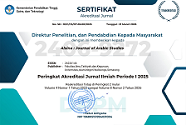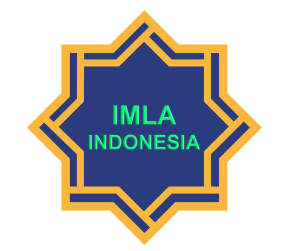Peran Dosen Native Speaker dalam Pembelajaran Bahasa Arab di Perguruan Tinggi
DOI:
https://doi.org/10.21580/alsina.6.2.22385Keywords:
Arabic language learning, higher education, native speaker roleAbstract
This study aims to analyze the implementation of Arabic language learning with a native speaker at the Arabic Language Education Program (PBA) of UIN Walisongo Semarang, the role of the native speaker in enhancing language skills, and the responses of the 2021 cohort students to their presence. Employing a mixed methods approach with a convergent parallel design, the study integrates qualitative data from observations, interviews, and documentation, and quantitative data from a Guttman scale questionnaire involving 24 International Class Program (ICP) students in the sixth semester. Findings indicate that the native speaker enhances kalām (speaking) and istimāʿ (listening) skills through a bī’ah lughawīyah (Arabic language environment). The native speaker serves as a teacher, authentic language source, motivator, facilitator, and provider of Arabic cultural insights. Students responded positively, most agreeing on the native speaker’s role and expressing satisfaction and comfort. The study suggests integrating native and non-native teachers and developing cultural modules for optimal learning outcomes.
Downloads
References
Ali, Asem Shehadeh et al. “Teaching Arabic Vocabulary Through Dialogue and Its Procedures for Learners of Arabic as a Foreign Language.” Evolutionary Studies in Imaginative Culture 8.2, no. S2 (2024): 1451–59. https://doi.org/10.70082/esiculture.vi.1624.
Alwani, Alwani. “Istirātījīyāt Taʿlīm ʿAnāshir Al-Lughah Wa-Al-Mahārāt Al-Lughawīyah Al-ʿArabīyah.” Alsina : Journal of Arabic Studies 3, no. 2 (2021): 159–80. https://doi.org/10.21580/alsina.3.2.8592.
Ansori, Ansori. Peran Native Speaker dalam Meningkatkan Pembelajaran Bahasa Arab (Studi Kasus di Madrasah Aliyah Raudlatul Ulum Guyangan Trankil Pati) (Master’s Thesis). Yogyakarta: UIN Sunan Kalijaga Yogyakarta, 2016.
Árva, Valéria, and Peter Medgyes. “Native and Non-Native Teachers in the Classroom.” System 28, no. 3 (2000): 355–72. https://doi.org/10.1016/S0346-251X(00)00017-8.
Azimi, Zulfadli Al. Pengembangan Media Pembelajaran Maharah Al–Kalam Berbasis Aplikasi “Native Speaker” di IAIN Curup (Master’s Thesis). Yogyakarta: UIN Sunan Kalijaga Yogyakarta, 2023. https://digilib.uin-suka.ac.id/id/eprint/64497/.
Bani, Moh Yusuf. Manajemen Pembelajaran Bahasa Arab melalui Guru Penutur Asli (Native Speaker) dalam Meningkatkan Mutu Berbahasa Arab Santri Al-Wafi Islamic Boarding School Depok Jawa Barat (Master’s Thesis). Jakarta: Institut PTIQ Jakarta, 2023. https://repository.ptiq.ac.id/id/eprint/1630/.
Bashori, M., and Syaiful Syaiful. “Istikhdām Uslūb al-Taʿallum lil-Muʿallim al-Nātiq al-Aṣlī bi-al-Arabīyah.” Jurnal Alfazuna : Jurnal Pembelajaran Bahasa Arab dan Kebahasaaraban 8, no. 1 (2023): 63–75. https://doi.org/10.15642/alfazuna.v8i1.3700.
Chaer, Abdul. Psikolinguistik Kajian Teoritik. Jakarta: Rineka Cipta, 2003.
Deng, Liwei et al. “Exploring Native and Non-Native English Speaker Teachers’ Perceptions of English Teacher Qualities and Their Students’ Responses.” Frontiers in Psychology 14 (2023): 1175379. https://doi.org/10.3389/fpsyg.2023.1175379.
Fauzi, Safran. Peran Native Speaker dalam Lingkungan Berbahasa Arab: Studi Kasus di Madrasah Aliyah Minhajul Haq Purwakarta (Master’s Thesis). Bandung: UIN Sunan Gunung Djati Bandung, 2024. https://digilib.uinsgd.ac.id/90534/.
Ghane, Mohammad Hossein, and Mohammad Hasan Razmi. “Exploring the Effectiveness of Native and Non-Native English Teachers on EFL Learners’ Accuracy, Fluency, and Complexity in Speaking.” Edited by Barry Lee Reynolds. Education Research International 4011255 (2023): 1–8. https://doi.org/10.1155/2023/4011255.
Gu, Michelle Mingyu et al. “Exploring the Professional Teacher Identity as Ethical Self-Formation of Two Multilingual Native English Teachers.” Language Teaching Research, 2022. https://doi.org/10.1177/13621688221117061.
Hayat, Marjanul. Peran Native Speaker dalam Meningkatkan Maharah Kalam Siswa Dayah Darul Ihsan (Undergraduate Thesis). Banda Aceh: UIN Ar-Raniry, 2024. https://repository.ar-raniry.ac.id/id/eprint/37125/.
Hennebry-Leung, Mairin, and Hu Amy Xiao. “Examining the Role of the Learner and the Teacher in Language Learning Motivation.” Language Teaching Research 27, no. 1 (2023): 30–56. https://doi.org/10.1177/1362168820938810.
Hermawan, Acep. Metodologi Pembelajaran Bahasa Arab. Bandung: PT. Remaja Rosdakarya, 2014.
Hossain, Kazi Imran. “Reviewing the Role of Culture in English Language Learning: Challenges and Opportunities for Educators.” Social Sciences & Humanities Open 9 (2024): 100781. https://doi.org/10.1016/j.ssaho.2023.100781.
Jannatin, Nur. Upaya Dosen Native Speaker dalam Meningkatkan Keterampilan Berbicara (Al Kalam) pada Mahasiswa Fakultas Tarbiyah dan Keguruan Tahun Akademik 2009/2010 di Pusat Bahasa, Budaya dan Agama UIN Sunan Kalijaga Yogyakarta (Undergraduate Thesis). Yogyakarta: UIN Sunan Kalijaga Yogyakarta, 2010. https://digilib.uin-suka.ac.id/id/eprint/57160/.
Kim, Deoksoon. “Learning Language, Learning Culture: Teaching Language to the Whole Student.” ECNU Review of Education 3, no. 3 (2020): 519–41. https://doi.org/10.1177/2096531120936693.
Krashen, Stephen D. Principles and Practice in Second Language Acquisition. Oxford: Pergamon Press, 1982.
Llurda, Enric, and Júlia Calvet-Terré. “Native-Speakerism and Non-Native Second Language Teachers: A Research Agenda.” Edited by Enric Llurda. Language Teaching, Educational Linguistics, 57, no. 2 (2024): 229–45. https://doi.org/10.1017/S0261444822000271.
Margani, Ahmad. Pengaruh Penutur Asli Bahasa Arab dalam Meningkatkan Kemampuan Berbicara Mahasantri Ma’had Al-Jami’ah UIN Mataram (Undergraduate Thesis). Mataram: UIN Mataram, 2023. https://etheses.uinmataram.ac.id/8221/.
Neuliep, James W. “Sapir–Whorf Hypothesis.” In The International Encyclopedia of Intercultural Communication, edited by Kim Young Yun, 1–5. Hoboken: Wiley, 2017. https://doi.org/10.1002/9781118783665.ieicc0111.
Oliveira, Luciana C. de, and Beth Clark-Gareca. “Collaboration between NESTs and NNESTs.” In Native and Non-Native Teachers in English Language Classrooms: Professional Challenges and Teacher Education, edited by Juan de Dios Martinez Agudo, 317–36. Berlin, Boston: De Gruyter Mouton, 2017. https://doi.org/10.1515/9781501504143-016.
Parera, Jos Daniel. Leksikon Istilah Pembelajaran Bahasa. Jakarta: Gramedia Pustaka Utama, 1993.
Peter Medgyes. The Non-Native Teacher. London: Macmillan, 1994.
Phillipson, R. “ELT: The Native Speaker’s Burden?” ELT Journal 46, no. 1 (1992): 12–18. https://doi.org/10.1093/elt/46.1.12.
Pratama, Zul Rizki. Persepsi Mahasiswa Bahasa Arab Angkatan 2016 dan 2017 terhadap Native Speaker dalam Pembelajaran Bahasa Arab pada Prodi Pendidikan Bahasa Arab di IAIN Palangka Raya (Undergraduate Thesis). Palangka Raya: IAIN Palangka Raya, 2020. http://digilib.iain-palangkaraya.ac.id/3345/.
Rao, Zhenhui, and Huijun Yu. “Enhancing Students’ English Proficiency by Co-Teaching between Native and Non-Native Teachers in an EFL Context.” Language Teaching Research 25, no. 5 (2021): 778–97. https://doi.org/10.1177/1362168819873937.
Richards, Jack C., and Theodore S. Rodgers. Approaches and Methods in Language Teaching. Cambridge: Cambridge University Press, 2014. https://doi.org/10.1017/9781009024532.
Rosyidi, Abdul Wahab, and Mamlu’atul Ni’mah. Memahami Konsep Dasar Pembelajaran Bahasa Arab. Malang: UIN-Maliki Press, 2018.
Soekanto, Soerjano. Sosiologi Suatu Pengantar. Edisi Baru. Jakarta: Rajawali Pers, 2009.
Su, Wei, and Xiaoqi Shang. “NNS and NES Teachers’ Co-Teaching of Interpretation Class: A Case Study.” The Asia-Pacific Education Researcher 29, no. 4 (2020): 353–64. https://doi.org/10.1007/s40299-019-00489-7.
Walkinshaw, Ian, and Duongthi Hoang Oanh. “Native and Non-Native English Language Teachers.” Sage Open 4, no. 2 (2014). https://doi.org/10.1177/2158244014534451.
Wiyanti, Indri. Native Speakers dalam Pembelajaran Bahasa Arab Produktif (Al-Kalam dan Al-Kitabah) pada Program Studi Pendidikan Bahasa Arab Fakultas Tarbiyah Universitas Islam Negeri Sunan Kalijaga Yogyakarta (Undergraduate Thesis). Yogyakarta: UIN Sunan Kalijaga Yogyakarta, 2007. https://digilib.uin-suka.ac.id/id/eprint/17339/.
Zedan, Ashraf M. et al. “The Role of Language in Education: Arabic as Case Study.” Procedia - Social and Behavioral Sciences 70 (2013): 1002–8. https://doi.org/10.1016/j.sbspro.2013.01.151.
Downloads
Published
How to Cite
Issue
Section
License
Copyright (c) 2024 Alsina : Journal of Arabic Studies

This work is licensed under a Creative Commons Attribution-NonCommercial-ShareAlike 4.0 International License.
Copyright
The copyright of the received article shall be assigned to the publisher of the journal. The intended copyright includes the right to publish the article in various forms (including reprints). The journal maintains the publishing rights to published articles. Authors are allowed to use their articles for any legal purposes deemed necessary without written permission from the journal, but with an acknowledgment to this journal of initial publication.
Licensing
In order for Alsina: Journal of Arabic Studies to publish and distribute research articles, the editors need publishing rights (transferred from author to publisher). This agreement relates to the transfer/publishing copyright license to Alsina: Journal of Arabic Studies but the authors still have significant rights to use and share their published articles.
Alsina: Journal of Arabic Studies supports the need for writers to share, disseminate and maximize the impact of their research and their rights on any database. As a journal article writer, you have the right to various uses of your articles, including that by the institution or company where you work. Copyright can be used without the need for special permission. Authors who publish articles in the Alsina: Journal of Arabic Studies have broad rights to use their work for teaching and scientific purposes without requesting permission, including:
- Use by the author for lectures, presentations, or conferences, with distribution of copies to participants;
- Distribution to colleagues for research use;
- Use in compilations of the author's subsequent work;
- inclusion in a thesis or dissertation;
- Reuse of sections or excerpts from articles in other works (with full acknowledgment of the final article);
- Preparation of derivative works (other than commercial purposes) (with full acknowledgment of the final article);
- Voluntary posting on open websites operated by authors’ or writers' agencies for scientific purposes
When submitting a manuscript, authors do so on the understanding that if accepted for publication, the copyright for publishing (publishing right) of the article shall be assigned/transferred to Alsina: Journal of Arabic Studies.
Authors whose articles are accepted for publication will receive confirmation via email and sent a Copyright Transfer Agreement.

 Accreditation
Accreditation 
 In Collaboration with
In Collaboration with 

 Visitors
Visitors  Article Template
Article Template





